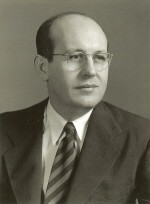Wayne Oates
Wayne Oates, professor of psychology of religion and pastoral care 1947-1974, was born in Greenville, South Carolina in June 1917. Born poor, Oates was selected to serve as a page in the U.S. Senate when fourteen. The experience encouraged him to pursue higher education, making Oates the first member of his family to do so. He entered Wake Forest University and subsequently studied at Southern Seminary, Union Seminary, and the University of Louisville School of Medicine. After graduating from Southern with a Ph.D. in Psychology of Religion, Oates joined the School of Theology as a psychology professor in 1947.
In his field, Oates sought to combine pastoral sensitivity, biblical teaching, and mainstream psychological insights. This blending of disciplines reshaped traditional thinking on counseling and produced the modern pastoral care movement. Within the counseling community, Oates pioneered the model of pastoral counseling as a process involving “trialogue,” a three-way conversation between counselor, counselee, and the Holy Spirit. He wrote fifty-seven books, among them such works as The Christian Pastor, Confessions of a Workaholic, and The Presence of God in Pastoral Counseling. He was an innovative psychologist who brought his creativity to bear on the English language when he created the word “workaholic.” The term, recognized by the Oxford English Dictionary, assimilated into mainstream vocabulary rapidly after it first appeared in Oates’s writing.
With his wife, Pauline, Oates parented two sons. The couple, members of St. Matthews Baptist Church, lived in Louisville until his death in October 1999.
In 2022, the Kornhauser Health Sciences Library of the University of Louisville became the permanent home for archival materials formerly under stewardship of the Wayne E. Oates Institute.
Sources:
Oates Institute, Heritage of Dr. Oates Available from http://www.oates.org/legacy/weo_history.html.
Wayne E. Oates, The Struggle to Be Free, Philadelphia, PA: The Westminster Press, 1983.

